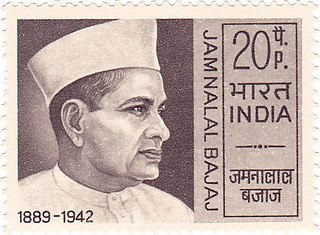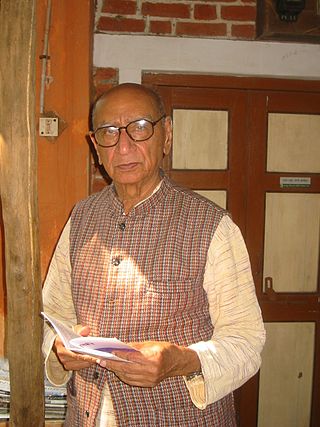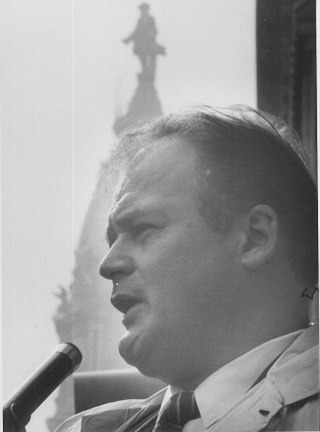Michael N. Nagler (born January 20, 1937) is an American academic, nonviolence educator, mentor, meditator, and peace activist.
Michael N. Nagler (born January 20, 1937) is an American academic, nonviolence educator, mentor, meditator, and peace activist.
Nagler is professor emeritus of Classics and Comparative Literature at UC Berkeley, where he founded the Peace and Conflict Studies Program and taught upper-division courses on nonviolence, meditation and a seminar on the meaning of life. [1] Nagler also participated in the Free Speech Movement. [2] He is President of the Metta Center for Nonviolence and author of The Search for a Nonviolent Future, The Nonviolence Handbook, and The Third Harmony: Nonviolence and the New Story of Human Nature (March, 2020), and co-host of Nonviolence Radio and The Nonviolence Report. In 2007 Michael received the Jamnalal Bajaj international award for Promoting Gandhian Values Outside India. [3] He has spoken for the UN, the US Institute of Peace, and many academic and public venues for over thirty years. He has lived at the Blue Mountain Center of Meditation's ashram in Northern California since 1970.
This section of a biography of a living person does not include any references or sources .(June 2020) |
{{cite book}}: CS1 maint: others (link)Articles and Chapters (Peace Studies):
Articles (Classics and Comparative Literature):
Anthologies

Nonviolence is the personal practice of not causing harm to others under any condition. It may come from the belief that hurting people, animals and/or the environment is unnecessary to achieve an outcome and it may refer to a general philosophy of abstention from violence. It may be based on moral, religious or spiritual principles, or the reasons for it may be strategic or pragmatic. Failure to distinguish between the two types of nonviolent approaches can lead to distortion in the concept's meaning and effectiveness, which can subsequently result in confusion among the audience. Although both principled and pragmatic nonviolent approaches preach for nonviolence, they may have distinct motives, goals, philosophies, and techniques. However, rather than debating the best practice between the two approaches, both can indicate alternative paths for those who do not want to use violence.
Pietro Ameglio is an Uruguayan-born Mexican civil rights and peace activist known for his advocacy of nonviolence and efforts to promote peace and anti-militarism in Mexico.

Sri Lankabhimanya Ahangamage Tudor Ariyaratne was a Sri Lankan activist, founder and president of the Sarvodaya Shramadana Movement. He was nominated to the Constitutional Council as a civil representative on 10 September 2015. He received the Jamnalal Bajaj Award in 1991.

Jamnalal Kaniram Bajaj was an Indian industrialist. He founded the Bajaj Group of companies in the 1920s, and the group now has 24 companies, including six that are listed on the bourses. He was also a close and beloved associate of Mahatma Gandhi, who is known to have often declared that Jamnalal was his fifth son.

Narayan Desai was an Indian Gandhian and author.
Gandhian economics is a school of economic thought based on the spiritual and socio-economic principles expounded by Indian leader Mahatma Gandhi. It is largely characterised by rejection of the concept of the human being as a rational actor always seeking to maximize material self-interest that underlies classical economic thinking. Where Western economic systems were based on what he called the “multiplication of wants,” Gandhi felt that this was both unsustainable and devastating to the human spirit. His model, by contrast, aimed at the fulfillment of needs – including the need for meaning and community. As a school of economics the resulting model contained elements of protectionism, nationalism, adherence to the principles and objectives of nonviolence and a rejection of class war in favor of socio-economic harmony. Gandhi's economic ideas also aim to promote spiritual development and harmony with a rejection of materialism. The term "Gandhian economics" was coined by J. C. Kumarappa, a close supporter of Gandhi.

Rajagopal P. V. is an Indian Gandhian activist, a former Vice Chairman of the New Delhi Gandhi Peace Foundation, and the president and founding member of Ekta Parishad. In 1972, Rajagopal started working alongside Gandhian activists J.P. Narayan and Subba Rao to disarm 578 bandits in the Chambal region of India. Thereafter, he stayed away from dealing with direct violence and focused on the people of Adivasis, bonded labourers, and other landless communities affected by poverty and exploitation.
Constructive Program is a term coined by Mahatma Gandhi to describe one of the two branches of his satyagraha, the other being some form of nonviolent resistance, e.g. civil disobedience. The value of a Constructive Program in the struggle for the independence of India cannot be overemphasized, as Gandhi described civil disobedience as "an aid to constructive effort." Gandhi wrote to his friend and supporter, Jamnalal Bajaj, saying, "My real politics is constructive work." Gandhi's constructive work included a campaign for people to spin their own cloth at home and mine their own salt to avoid having to buy from the British in their anti-colonial struggle.
Glenn Durland Paige was an American political scientist. He was Professor Emeritus of political science at the University of Hawaiʻi and Chair of the Governing Council of the Center for Global Nonkilling. Paige is known for developing the concept of nonkilling, his studies on political leadership, and the study of international politics from the decision-making perspective with a case study of President Harry S. Truman's decision to involve the United States in the Korean War.
Homer A. Jack was an American Unitarian Universalist clergyman pacifist and social activist who helped found the Congress of Racial Equality and National Committee for a Sane Nuclear Policy (SANE).

Anupam Mishra was an Indian Gandhian, author, journalist, environmentalist, TED speaker, and water conservationist who worked on promoting water conservation, water management and traditional rainwater harvesting techniques. He had been awarded the 1996 Indira Gandhi Paryavaran Puraskar (IGPP) award instituted by the Ministry of Environment and Forests, Government of India. He travelled to villages across several Indian states, especially Rajasthan, Madhya Pradesh, Maharashtra, and Uttar Pradesh, describing the value of time-tested systems of water harvesting. He advocated conservation of traditional water structures in India as well as abroad. He wrote books like Aaj Bhi Khare Hain Talaab and Rajasthan Ki Rajat Boondein, landmark works in the field of water conservation. An extensive interview with Mishra about the history and future of the Yamuna River occupies the last chapter of Rana Dasgupta's book Capital: The Eruption of Delhi.

Gandhi as a Political Strategist is a book about the political strategies used by Mahatma Gandhi, and their ongoing implications and applicability outside of their original Indian context. Written by Gene Sharp, the book was originally published in the United States in 1979. An Indian edition was published in 1999. The book has been reviewed in several professional journals.
Jharna Dhara Chowdhury was a Bangladeshi social activist.

Jugatram Chimanlal Dave (1892–1985) was a Gandhian social activist, freedom fighter and author from Gujarat, India who is remembered for his social work among the tribals of southern Gujarat.
Meta Peace Team (MPT), formerly Michigan Peace Team, is a nonprofit, grassroots organization founded in 1993 that seeks to pursue peace through active nonviolence and create an alternative to militarism through empowered peacemaking. MPT provides creative nonviolence training workshops to ordinary citizens with a framework of third party nonviolent intervention (TPNI), and it deploys peace teams to conflict areas both domestically and internationally. Its peace teams have worked in places such as Iraq, Haiti, Bosnia, Egypt, Panama, Mexico, Gaza Strip, and the West Bank; they have also been placed within the United States to create peaceful presences at national and state political conventions, Ku Klux Klan rallies, and gay pride parades, among many other events. MPT also works in collaboration with other peace and justice groups around the globe, including Nonviolent Peaceforce, Christian Peacemaker Teams, Veterans for Peace, the International Solidarity Movement, Peace Brigades International, the Shanti Sena Network, and the Metta Center for Nonviolence. Its current offices are located in Lansing and Detroit, Michigan. MPT is a founding member of the Shanti Sena Network.

Charles Coates Walker was an American Quaker activist and trainer for nonviolent direct action in both the civil rights and peace movements. He worked throughout his life to bring segregation, racial injustice, nuclear and biological weapons, and war to public awareness. He used Gandhian methods of nonviolence, writing training materials and organizing marches, vigils, protest demonstrations, conferences and campaigns in different parts of the world.
Chunibhai Vaidya, popularly called Chunikaka, was an Indian activist, author and a Gandhian ideologue from Gujarat, India.
Acharya Ramamurti was an Indian social activist, gandhian, educationist and academic. He headed the review committee of 1990, popularly known as Ramamurti Review Committee, for evaluating the progress of the National Policy on Education of 1986. He was the director of Shrambharati, a non governmental organization, engaged in community development, adhering to Gandhian ideals. The Government of India awarded him the fourth highest civilian award of the Padma Shri in 1999.

Rabindra Nath Upadhyay (1923–2010) was an Indian social worker, Gandhian and the founder of Tamulpur Anchalik Gramdan Sangha (TAGS), a non governmental organization working for the social development of the rural people in the Kumarikata village of Assam. He was a recipient of the 2003 Jamnalal Bajaj Award. The Government of India awarded him the fourth highest civilian award of the Padma Shri, in 2000, for his services to the society.
Padmanabha Pillai Gopinathan Nair was an Indian social worker, Gandhian, independence activist, and the chairman of Mahatma Gandhi National Memorial Trust. He participated in the Quit India movement of 1942 and worked alongside Vinoba Bhave to promote Bhoodan and Gramdan movements. He was the initiator of the camp movement, a student program that was part of the Construction Movement of Mahatma Gandhi. He was a recipient of the Jamnalal Bajaj Award, among other honors. The Government of India awarded him the fourth highest civilian honour of the Padma Shri, in 2016, for his contributions to society.